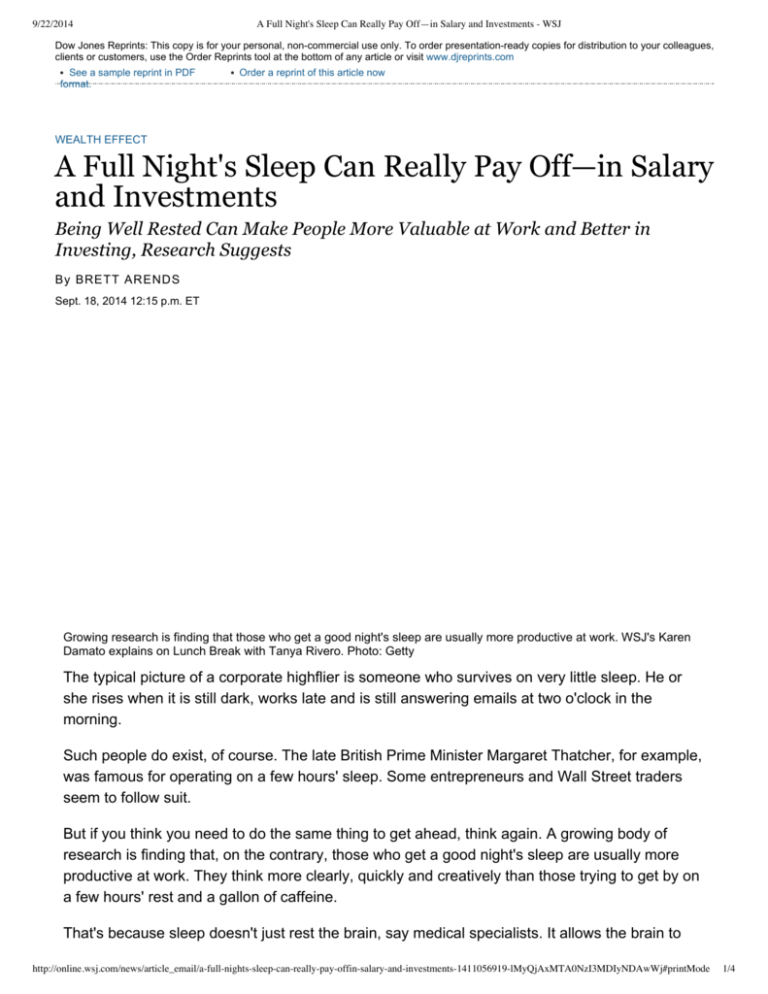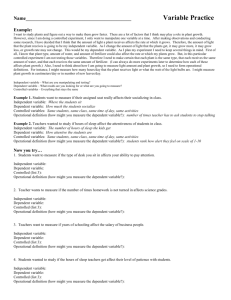
9/22/2014
A Full Night's Sleep Can Really Pay Off—in Salary and Investments - WSJ
Dow Jones Reprints: This copy is for your personal, non­commercial use only. To order presentation­ready copies for distribution to your colleagues,
clients or customers, use the Order Reprints tool at the bottom of any article or visit www.djreprints.com
See a sample reprint in PDF
format.
Order a reprint of this article now
WEALTH EFFECT
A Full Night's Sleep Can Really Pay Off—in Salary
and Investments
Being Well Rested Can Make People More Valuable at Work and Better in
Investing, Research Suggests
By BRETT ARENDS
Sept. 18, 2014 12:15 p.m. ET
Growing research is finding that those who get a good night's sleep are usually more productive at work. WSJ's Karen
Damato explains on Lunch Break with Tanya Rivero. Photo: Getty
The typical picture of a corporate highflier is someone who survives on very little sleep. He or
she rises when it is still dark, works late and is still answering emails at two o'clock in the
morning.
Such people do exist, of course. The late British Prime Minister Margaret Thatcher, for example,
was famous for operating on a few hours' sleep. Some entrepreneurs and Wall Street traders
seem to follow suit.
But if you think you need to do the same thing to get ahead, think again. A growing body of
research is finding that, on the contrary, those who get a good night's sleep are usually more
productive at work. They think more clearly, quickly and creatively than those trying to get by on
a few hours' rest and a gallon of caffeine.
That's because sleep doesn't just rest the brain, say medical specialists. It allows the brain to
http://online.wsj.com/news/article_email/a-full-nights-sleep-can-really-pay-offin-salary-and-investments-1411056919-lMyQjAxMTA0NzI3MDIyNDAwWj#printMode
1/4
9/22/2014
A Full Night's Sleep Can Really Pay Off—in Salary and Investments - WSJ
perform vital maintenance and restoration tasks. Brains that get too little sleep simply cannot
perform as well as those that are rested.
"There's no doubt that sleep deprivation affects job
performance," says the Detroit Medical Center's
Read the UCSD Study
Safwan Badr, a former president of the American
Academy of Sleep Medicine. "The evidence is compelling that when you do not get enough
sleep…you are not as productive."
More
Investors, Take Heed
Investors should also take heed: Numerous studies have found that those running on too little
sleep tend to make poorer investment decisions and take needless risks as well.
Charles Czeisler, a sleep specialist at Brigham & Women's Hospital in Boston, agrees. "Missing
a night's sleep degrades our neurobehavioral performance"—that is, our mental acuity—"by the
equivalent to being legally drunk," he says. And, he warns, this doesn't only apply if you miss
one night's sleep completely; you'll see similar effects if you simply sleep too little each night
over time.
For the first time, new research has attempted to put some numbers on the link between more
Zzzs and more Benjamins. Matthew Gibson and Jeffrey Shrader, graduate researchers in the
economics department of the University of California, San Diego, compared wage data with
sleep times recorded in the U.S. Census Bureau's American Time Use Survey. Their conclusion:
For those who are sleeping too little, "a one­hour increase in long­run average sleep increases
wages by 16%, equivalent to more than a year of schooling."
Adults need eight hours of sleep on average, experts say. There is some variation between
individuals, but it is far less than many think. Many of those who think they can be just as
productive with a lot less are fooling themselves, he says. In round numbers, the percentage of
adults who can really get by on five hours or less per night "is about zero," says Dr. Czeisler.
It's easy to be fooled. Research suggests that tired professionals are still able to go through the
motions of their jobs—such as sitting in meetings, understanding reports, and performing the
kinds of routine professional tasks they usually undertake.
http://online.wsj.com/news/article_email/a-full-nights-sleep-can-really-pay-offin-salary-and-investments-1411056919-lMyQjAxMTA0NzI3MDIyNDAwWj#printMode
2/4
9/22/2014
A Full Night's Sleep Can Really Pay Off—in Salary and Investments - WSJ
A new study says investors may make poor decisions when they are sleep­deprived. Associated Press
Modern corporations often push key employees to go short on sleep, demanding they work
longer hours and stay in touch late at night. But sleep loss impairs higher­level brain skills.
When we are tired, we find it much harder to think innovatively and to make creative leaps, say
researchers. We find it harder to adapt our thinking to new information or to learn new lessons.
We struggle to make good judgments in very ambiguous situations. We are also more
vulnerable to mood swings, more irritable and less able to get along with others.
Consider: At England's Loughborough University in 1999, researchers Yvonne Harrison and
James Horne tested the effects of sleep deprivation on a small group of healthy young
participants. They were given complex business­situation tasks in the form of a game, as well as
some critical reading tasks. Those who went short on sleep were able to keep up with the
reading, they found. But when it came to the complex game, "their play collapsed," they
reported.
'Herd Mentality'
http://online.wsj.com/news/article_email/a-full-nights-sleep-can-really-pay-offin-salary-and-investments-1411056919-lMyQjAxMTA0NzI3MDIyNDAwWj#printMode
3/4
9/22/2014
A Full Night's Sleep Can Really Pay Off—in Salary and Investments - WSJ
In other words, if you're a white­collar professional, sleep loss may not get you fired. But it may
be stopping you from doing the things that would get you a promotion. It may even help explain
the "herd mentality" often seen on Wall Street.
Yet even as more of us are working in jobs that require innovative and creative thinking, we are
getting less and less sleep.
We get far less sleep than our grandparents, say specialists. Dr. Czeisler says 20% to 30% of
workers sleep less than six hours a night during the week. Fifty years ago, he says, the number
was around 2% to 3%.
Experts blame electric lights, alarm clocks, and now the Internet and smartphones.
"If you need an alarm clock to wake you up, by definition, you're not getting enough sleep,"
warns Dr. Czeisler. Some patients tell him they keep their smartphones by their bedside table so
they can check emails last thing at night, first thing in the morning, and in the middle of the night
if they wake up.
His verdict: "It's insane."
Write to Brett Arends at brett.arends@wsj.com
Copyright 2014 Dow Jones & Company, Inc. All Rights Reserved
This copy is for your personal, non­commercial use only. Distribution and use of this material are governed by our Subscriber Agreement and by
copyright law. For non­personal use or to order multiple copies, please contact Dow Jones Reprints at 1­800­843­0008 or visit
www.djreprints.com
http://online.wsj.com/news/article_email/a-full-nights-sleep-can-really-pay-offin-salary-and-investments-1411056919-lMyQjAxMTA0NzI3MDIyNDAwWj#printMode
4/4






